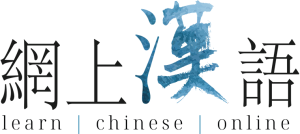Grammar 7
Learn Chinese: grammar 7
The classifiers
In Mandarin Chinese, when using a demonstrative (this, that, those, etc.) or a numeral with a noun, we must insert a character called "classifier" or "measure word" between them. As the name suggests, classifiers organize nouns into categories.
Demonstrative and / or numeral + classifier + noun.
For example, the classifier for establishments is 家 jiā (which in another context means "family, home"):
- school :
一家学校 yì jiā xuéxiào
- this school :
这家学校 zhè jiā xuéxiào
- three hospitals:
三家医院 sān jiā yīyuàn
To express the quantity "two", one must use 两 liǎng and not 二 èr:
两家学校 liǎng jiā xuéxiào :
two schools
We can combine demonstrative and quantity:
这两家学校 zhè liǎng jiā xuéxiào :
these two schools
It is also necessary to insert a classifier with the interrogative word corresponding to the demonstrative (哪 nǎ which?) and the quantity (几 jǐ how many?):
几家医院? jǐ jiā yīyuàn ?
How many hospitals?
哪家医院? nǎ jiā yīyuàn ?
Which hospital?
With 哪, 一 is often used without changing the meaning:
哪一家医院? nǎ yì jiā yīyuàn ?
Which hospital?
The classifier for human is
个 gè :
这个人 zhè gè rén
this person
There are many classifiers. But some words have no particular classifier and 个 then acts as a general classifier:
这两个电话 zhè liǎng gè diànhuà
these two phones
一个名字 yí gè míngzì
a name
四个字 sì gè zì
4 letters / characters
Some words are their own classifiers:
两天 liǎng tiān
two days
三年 sān nián
three years
But for the other words, adding the classifier completely changes the meaning:
一月 yí yuè
january (the first month)
一个月 yí gè yuè
one month (duration)
The noun can be omitted:
这个 zhè gè
this one
这个不是我的。 Zhè gè bú shì wǒ de.
This one is not mine.
Finally, from a phonetic point of view, 这 zhè and 那 nà are often pronounced zhèi and nèi when used with a classifier. This comes from a contraction with 一 which can be used after the demonstrative (as with 哪):
这一个人 Zhè yí gè rén → 这个人 Zhèi gè rén :
this person.
这 and 那
这 zhè and 那 nà are demonstratives. They are used to designate something / somebody 这个人 "this person" or to introduce someone : 这是我的爸爸。 "Here is my father."
这 is used to designate something close while 那 serves to designate something remote. The difference is more pronounced than in English, and we must remember it!
By adding the suffix 儿 ér, two words can be created:
这儿 zhèr :
here
那儿 nàr :
there
想
想 xiǎng
is a word that means "to think, to want to":
我想他不是中国人。
I think he is not Chinese.
我不想去。
I do not want to go.
By extension 想 may mean "missing" in the emotional sense:
我想你。
I think of you. → I miss you !
我想家。
I miss my family.
Notice that in the West we say "I'm homesick." While the Asians will say "I miss my family." Traditionally the family is of great importance in Asia. Translating literally "I'm homesick." in Chinese would make no sense. We see here the importance of understanding culture when learning a language, but also how learning a foreign language allows us to better understand the foreign culture and also our own.
和
和 hé is the conjunction of coordination "and" but its use is more restricted in Chinese than in English: it is never used between two clauses.
For example we can say: 我想学汉语和日语。 I want to learn Chinese and Japanese.
But we cannot say 我想学汉语和我想去中国。 I want to learn Chinese and I want to go to China.
How do I know if a sentence has one or more clauses? (Well, yes, we are not all grammar wizards...) It's quite simple, just count up conjugated verbs in English. There is only one conjugated verb per clause:
In the sentence "I want to learn Chinese and I want to go to China", the conjugated verb ‘want’ is employed twice.
But if I want to say "I want to learn Chinese and go to China", there is only one conjugated verb (want). The other two verbs (to learn and to go) are in the infinitive:
我想学汉语和去中国。
It is important to emphasize this point because it is a very common mistake made by Western learners.
有
The verb "to have" is 有 yǒu:
我有一个中国朋友。
I have a Chinese friend.
The negation of 有 is ALWAYS 没:
我没有日本朋友。
I do not have aany Japanese friends.
Thus, with 有, the affirmative-negative question is in the form 有没有:
他有没有儿子?
Does he have a son?
With 有, the rule that 没 must not be used with 了 does not apply:
他没有工作了。
He no longer has a job.
有
is also used to express "there is":
这儿没有人。
There is no one here.
The absence of 的
When used in the context of close relationships (family, friends) 的 can be omitted:
我的爸爸 = 我爸爸
